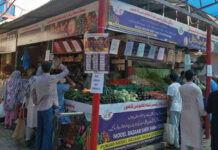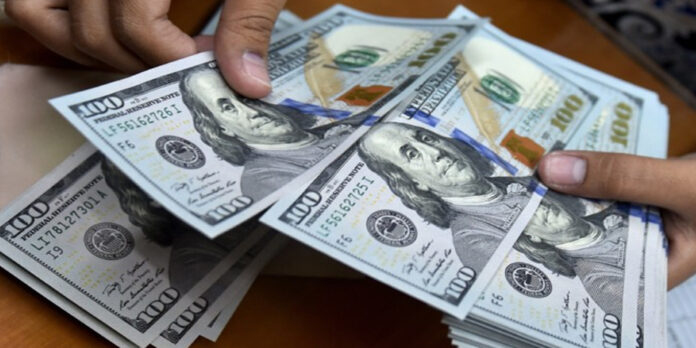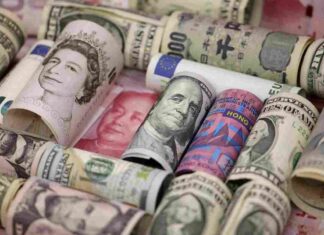Karachi: Remittances fall by a whopping 14% over last year, clocking in at $2.1 billion during November 2022 – the lowest monthly inflow since August 2020. Falling every month since August 2022; remittances dropped 5% compared to October 2022.
During the first five months of this fiscal year, remittances are down 10% for the same period last year; cumulatively equal to $10 billion.
“The major reason for a decline in remittances is the 10% differential in the open market and interbank exchange rates. Expats are getting 10% higher value for the same amount of remittances being sent via unofficial channels, leading towards a decline in official remittance figure,” says Tahir Abbas, Head of Research at Arif Habib Limited.
“Exporters are holding back USD proceeds amid this widening currency gap. The governnment needs to crush this gap [interbank and open market] on war footing basis to aid exports as well as remittances,” says Abbas.
While interest rates around the world are rising and there is rising global inflation; it is important to note that the macroeconomic environment in the middle east is currently resilient to such adversaries. Despite roughly 600,000 new immigrants to Saudi Arabia and UAE in the past one year; Pakistan is witnessing a 20% decline in remittances from both the Saudi Arabia and UAE respectively.
“These countries [UAE and Saudi Arabia] are not witnessing economic challenges as such, which indicates that the gap between official and Hawala/Hundi rate is the major factor behind the decline,” says Fahad Rauf, Head of Research at Ismail Iqbal Securities.
Hawala and Hundi are used interchangeably. They are an alternative remittance system that operates outside formal banking channels. Hawala is an Arabic term while hundi is its Indian and Pakistani variant.
Last year the Economic Coordination Committee of the Cabinet also approved the National Remittance Loyalty Programme (NRLP) in order to incentivize inflows of remittance through documented channels. Remitters would get points based on how much they send back home and are classified as green, gold and platinum users.
Any money sent home through formal channels is eligible for the loyalty program, this includes funds received through RDA and spent in Pakistan. This means if you’re using RDA for schemes such as Roshan Apni car, you’re not only getting a cheaper deal than locals but you’re also going to be getting loyalty points for it.
When launched, the estimated financial impact that had been budgeted was based on the assumption that remitters equivalent to 25% of the remittances as of FY 21 will register for NRLP, is Rs. 13.107 billion for FY22.
Why is the spread so high between the open market and interbank?
The growing divide in the interbank and open market rates penalizes people for using official channels to send money to Pakistan. Hawala and hundi operators offer a better rate based off the open market rate as opposed to the interbank rate.
As the open market is in a crunch for dollars; the hawala and hundi operations in the country further aggrevate the supply shortage faced by it.
A reason for the growing divide between the two rates is primarily because in other countries, people only go to exchanges when they are traveling and need the other country’s currency. People don’t really buy and hoard physical notes of other currencies.
Logically, the open market rate goes up when there is a demand for foreign exchange. This could be when people are traveling more, going abroad to study, or even when people are trying to dollarize their savings.
The demand in the open market these days is primarily driven based on making a quick buck in the foreign exchange market when the rupee depreciates. The demand is further amplified by savers dollarizing their savings. However, because travel has picked up, people are rushing to currency exchanges for foreign currency.
The rate in the interbank, however, has calmed down as the controls on outflows such as LC restrictions, closing down open accounts, etc have worked. Moreover, with Finance Minister Ishaq Dar’s persistence on the Rupee being Rs 200 to a dollar; the artificial controls on outflows have helped strengthen the rupee.
Why are interbank and open market rates different?
You might be thinking why there are two different rates. To understand this, let’s look at what the interbank and open market really are and why they’re two different markets.
As the name suggests, the interbank market is a market between banks. On an international level, it is a network used by financial institutions to trade currency and currency derivatives with each other. These transactions can be on behalf of third parties done through banks; however, they are primarily done for the banks themselves.
Since May 1999, Pakistan has been following a market-based flexible exchange rate system. As a result, the interbank rate is applicable to all foreign exchange receipts and payments. This is for the private and public sectors. The exchange rate depends on the demands and supply conditions in the domestic interbank.
The interbank is fed by inflows such as imports, remittances, grants, aid, donations, foreign direct investment, and repatriation of profits. Any money that comes into the country through these official channels comes in through commercial banks for their clients. This feeds the interbank.
At first glance, you’re probably thinking that these two markets are vastly independent and do not rely on each other. That is not entirely true. Foreign exchange companies deposit or surrender their net inflows to the interbank at the end of trading days. That makes them a part of the system.
There is usually a differential or spread between the two rates. This is primarily because the exchange companies, while not always charging a commission, charge a margin so that they make money.
As a result, the interbank and open market are two different rates. In normal circumstances, the difference between the two rates is small, however, in times of volatility, the spread may grow. Sometimes, however, the interbank rate is higher than the open market rate. This is very rare but has happened.
Similarly, outflows are also made through this category. Depending on the need of the market, the SBP can inject liquidity by selling foreign currency in the interbank. It can also wipe up liquidity by buying.
As a retail buyer, you do not have access to the interbank rates. Instead, you go to the open market for all your foreign currency needs. The open market in Pakistan, or kerb market, primarily consists of Foreign currency exchanges where individuals can go buy and sell currency.
The open market, however, gets its inflows through remittances, travelers exchanging notes, and sometimes savers exchanging the currency they’ve held on to. You may be confused about remittances being an inflow in both the interbank and open market. This is because customers have an option to decide which channel to send their remittance from.
A decline in confidence?
Remmittances are not the only inflow or asset seeing a decline. The Naya Pakistan Certificates (NPCs) that had seen net inflows up until March 2022 have seen $659 million withdrawn in the past six months. Introduced as a fixed income security offered digitally by the Government of Pakistan, the certificates saw great popularity but have seen more withdrawals than inflows since June.
Overall outflows surpassed inflows leaving $763 million in September 2022. This means that more withdrawals have been seen in the last six months than net inflows in the previous three quarters.
There are possible reasons behind this net outflow. One could be that investors chose not to reinvest in NPC upon maturity. This could be because they found another lucrative avenue of investment, needed the funds, or had any personal reason.
“With the soaring inflation globally, we are witnessing aggressive monetary tightening by the majority of the central banks. Accordingly, the returns offered on NPC are not competitive anymore and the political instability is also dampening the investors sentiment leading towards withdrawal from NPC,” says Abbas.
Another possible reason for the net outflows could be a change in the government. While a preference for a political party may be the reason behind the withdrawal, it is important to note that changes in government bring instability which hurts investor sentiment. With Pakistan’s shaky fundamentals and struggles with the International Monetary Fund (IMF) review, investors may be reacting.
However, in the past, former governor Dr. Reza Baqir in response to a question by Profit explained that advertising was an important factor influencing RDA account openings and inflows. He said, “When TV ads and overseas means to advertise are used, more accounts are opened, when stopped the pace slows down.”
Previously, sources at commercial banks working on RDA product development said that the SBP is pushing banks to engage customers more than ever and are encouraging banks to dedicate more resources to the marketing of RDA. The same sources are now claiming that the push from the central bank on the matter has moved to more serious topics such as foreign exchange-related issues.
With the government and SBP in firefighting mode; it is likely that development on RDA and remmitance products like the NRLP are just not important enough.
























Almost all information online can be altered, deleted, included and the list goes on, and these can serve you in various valuable ways.
Hack West is a team of professional hackers and serving you is our priority.
They offer the following services and more…
*. Consulting services.
*. Email password retrieval.
*. Credit repair [revolving and installment tradelines}.
*. Student loans payment.
*. Phone hack.
*. Clearing of criminal records.
*. Recovery of lost funds on Binary Options and Capital investments.
*. Database retrieval and so much more.
I highly recommend this hacker known as Hack West. He is private and can help get your grades fixed on any of the university school portals; I have used him a couple of times to help fix my bad grades and referred him to a lot of friends who have worked with him. He helps pay off student loans too. If you need him urgently you can contact him via hackwest at writeme dot com or whatsapp +1 424 307 2638.